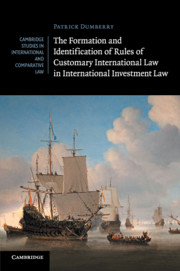Book contents
- Frontmatter
- Dedication
- Contents
- Foreword
- Preface
- Acknowledgments
- List of abbreviations
- Introduction
- 1 The concept of customary international law
- 2 Dancing with the sources: the fascinating story of the relative importance of custom and treaties at different times in the evolution of international investment law
- 3 State practice
- 4 Opinio juris
- 5 The fundamental importance of customary rules in international investment law
- General conclusion
- Bibliography
- Index
- cambridge studies in international and comparative law
5 - The fundamental importance of customary rules in international investment law
Published online by Cambridge University Press: 05 May 2016
- Frontmatter
- Dedication
- Contents
- Foreword
- Preface
- Acknowledgments
- List of abbreviations
- Introduction
- 1 The concept of customary international law
- 2 Dancing with the sources: the fascinating story of the relative importance of custom and treaties at different times in the evolution of international investment law
- 3 State practice
- 4 Opinio juris
- 5 The fundamental importance of customary rules in international investment law
- General conclusion
- Bibliography
- Index
- cambridge studies in international and comparative law
Summary
Introduction
As mentioned in the Introduction of this book, customary rules of international investment law remain of fundamental importance even in light of the present proliferation of BITs. The three reasons traditionally invoked why custom remains important in contemporary international law have been succinctly summarized by ILC Special Rapporteur Wood as follows:
Even in fields where there are widely accepted “codification” conventions, the rules of customary international law continue to govern questions not regulated by the conventions and continue to apply in relations with and between non-parties. Rules of customary international law may also fill possible lacunae in treaties, and assist in their interpretation.
The present chapter will begin by examining in detail these three ‘traditional’ reasons (Section 5.1). I will also explain another reason why arbitral tribunals should always take into account relevant rules of customary international law (Section 5.2). This is because ‘international law’ is the applicable law in an overwhelming majority of arbitration disputes. Even when this is not the case, international law must play an important role. Any tribunal having to apply international law will necessarily have to take into account relevant customary norms.
The present chapter will demonstrate, however, that custom is no panacea in the field of international investment law. The existence of a few rules of custom cannot solve all problems facing foreign investors. In particular, custom does not provide them access to international arbitration. The host State must consent to arbitration. Individuals and corporations lack any automatic jus standi before international tribunals in the absence of specific State consent. No customary rule has emerged that provides investors with a procedural ‘right’ to bring arbitration claims against the State where they make their investments. This question is further examined in Section 5.3.
Finally, I will examine the controversial theory of the ‘persistent objector’. While everyone agrees that a rule of customary international law is binding upon all States, scholars continue to debate another controversial question: whether a State should be permitted not to be bound by such a rule in the event that it objected to it in the early stage of its formation and does so consistently thereafter. In Section 5.4, I will examine the concrete application of the theory in the field of investor-State arbitration.
- Type
- Chapter
- Information
- The Formation and Identification of Rules of Customary International Law in International Investment Law , pp. 351 - 405Publisher: Cambridge University PressPrint publication year: 2016

